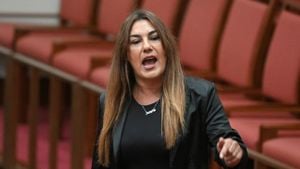Keir Starmer has drawn attention to the need for police to focus on pressing crime issues rather than pursuing investigations based on social media posts, following the growing controversy over the investigation of Daily Telegraph columnist Allison Pearson's tweet.
This situation erupted when Essex Police visited Pearson's home on Remembrance Sunday to discuss her tweet allegedly inciting racial hatred, which she had deleted over a year ago. Pearson expressed her surprise at the police's actions, claiming she was not made aware of the specific accusation against her tweet prior to the police visit.
Commenting on the incident, Starmer emphasized the importance of reallocative resources to tackle actual crimes, such as theft and criminal damage. He remarked to reporters, "the police can make their decisions and will obviously be held to account for those decisions." His comments come amid broader discussions about police focus on "non-crime hate incidents" (NCHIs) and whether social media scrutiny is diverting resources away from more pressing matters at hand.
Starmer's remarks have sparked discussions across political lines, with figures such as shadow home secretary Chris Philp emphasizing the need to recalibrate the way hate incidents are investigated, arguing it would be more judicious for the police to concentrate on investigating crimes. Philp voiced his concerns during appearances on various programs, asserting, "the police should concentrate on investigating crimes instead of venturing down social media rabbit holes."
The concern was heightened by the fact there were over 13,000 reported NCHIs recorded last year, which included instances involving children at schools. Critics assert this focus on social media posts is leading to unnecessary investigations and wasting police resources.
Essex Police defended their investigation, asserting it conducted its actions based on public complaints and the need to address potential criminal offences. They clarified by stating: "We police without fear or favour, and when crimes are reported to us by members of the public, we respond appropriately." The police reiterated their duty is to handle such situations even if they arise from online discussions.
Pearson has stated on social media about feeling "dumbstruck" by the investigation, invoking concerns about the overreach of police authority. Following her visit from the police, she claimed to still be unclear about which post had triggered the investigation. Speculation suggested her tweet might have been linked to pro-Palestine protests or recent conflicts surrounding Hamas' activities.
Elon Musk, the owner of X (formerly Twitter), added his voice to the backlash against the investigation, portraying it as part of broader issues concerning freedom of speech and the repercussions individuals face when expressing their views online. His comments resonate with many who feel discussions about free speech rights have now escalated to being treated as criminal matters.
Starmer's statements highlight the balancing act required between enforcing laws and safeguarding free speech, with Downing Street noting the police have the responsibility to assess and act upon potential risks associated with social media content only when genuinely necessary.
While Starmer’s dialogue has invited some support, many worried citizens feel apprehensive about policing speech, fearing it could set dangerous precedents. These concerns point to the age-old debate about where the boundaries lie between responsible commentary and incitement, particularly within tumultuous contexts such as recent global conflicts.
Even beyond the public sphere, this incident has evoked reactions from well-known figures. For example, feminist writer Julie Bindel shared her past similar experience when police visited her over comments made on social media, calling the situation "Orwellian" and stressing the police’s focus should be on severe crimes rather than the needless chasing of tweets.
Therefore, the Pearson incident has fueled public discourse over the role of the police, the nature of hate speech, and the boundaries between legitimate policing efforts and 'thought policing.' Those opposing the investigation contend it could quell dissent and silence political discourse which has been rising sharply over sensitive issues.
This recent outcry encapsulates the changing dynamics between law enforcement and individual rights amid the rapid evolution of digital communication. Starmer's statements indicate a potential pivot back to prioritizing traditional policing duties over monitoring social media, which many call for as they navigate these complex societal issues.



